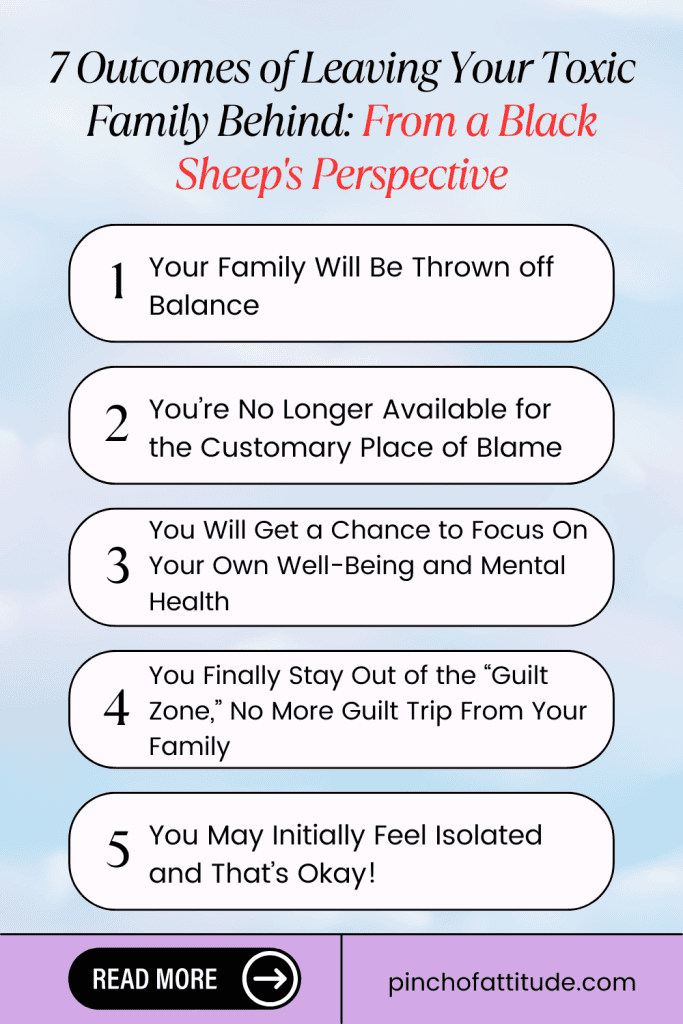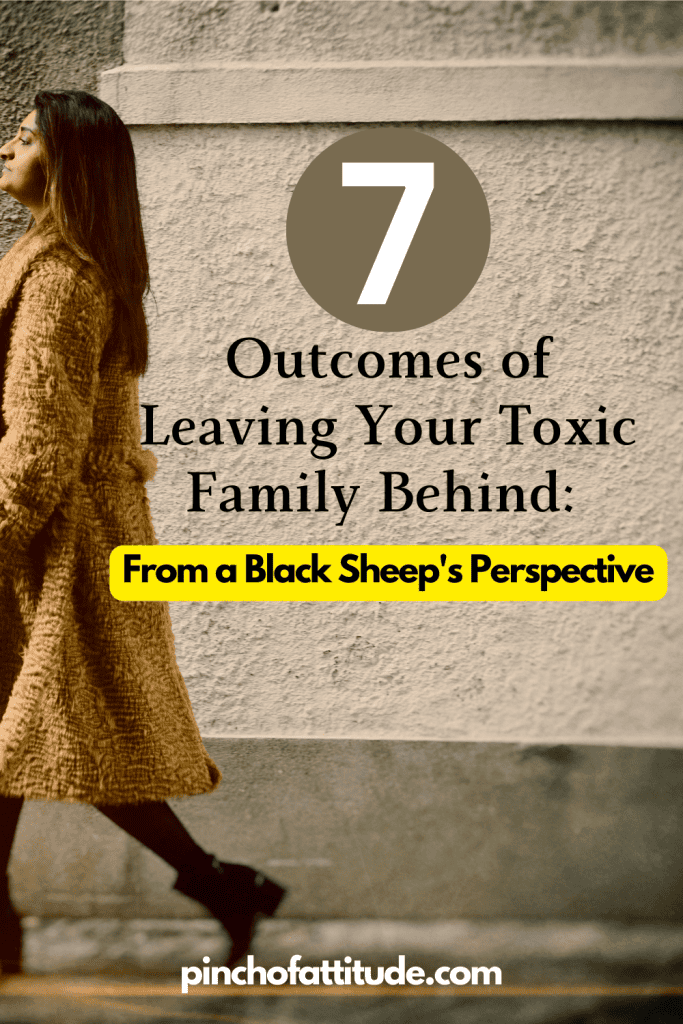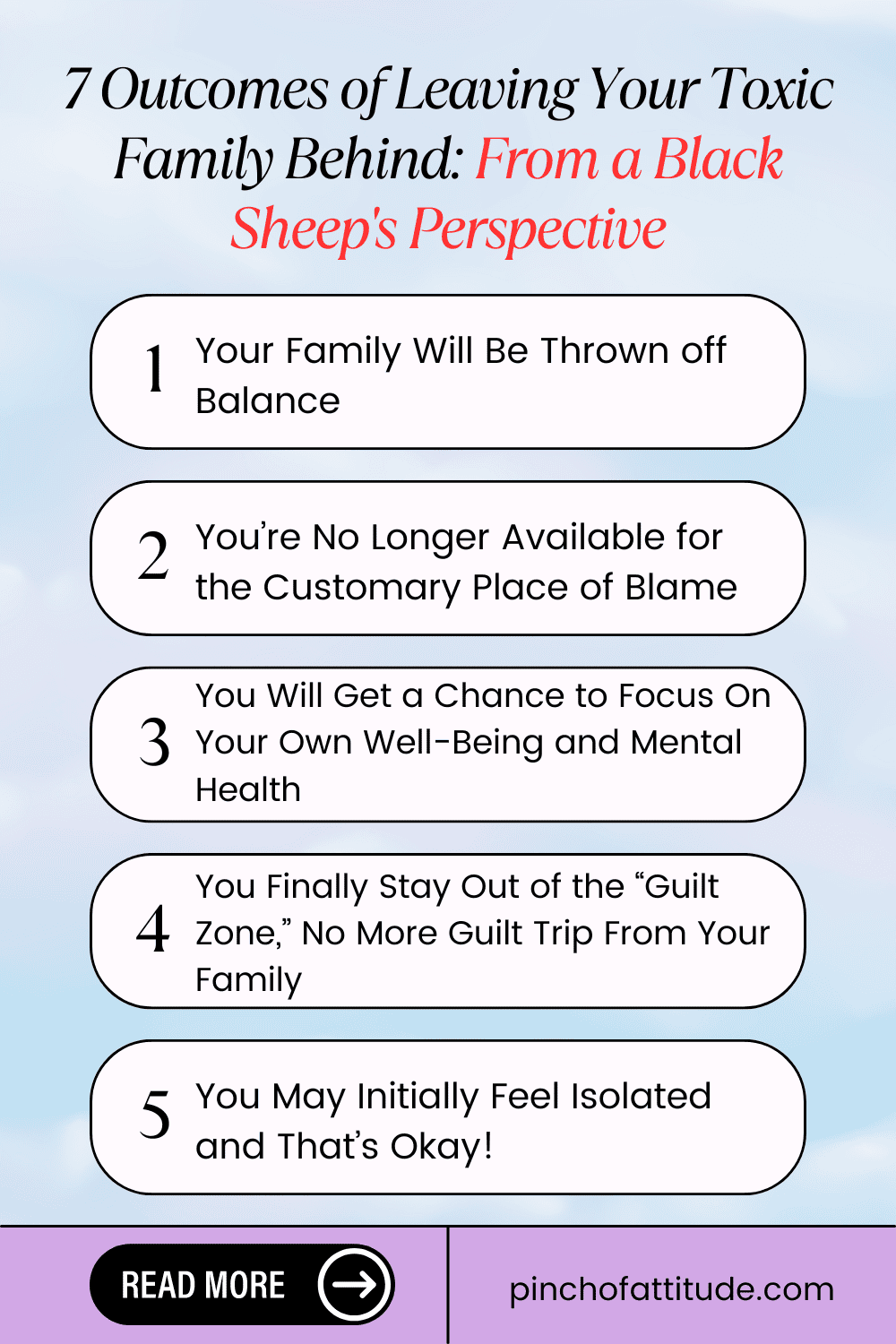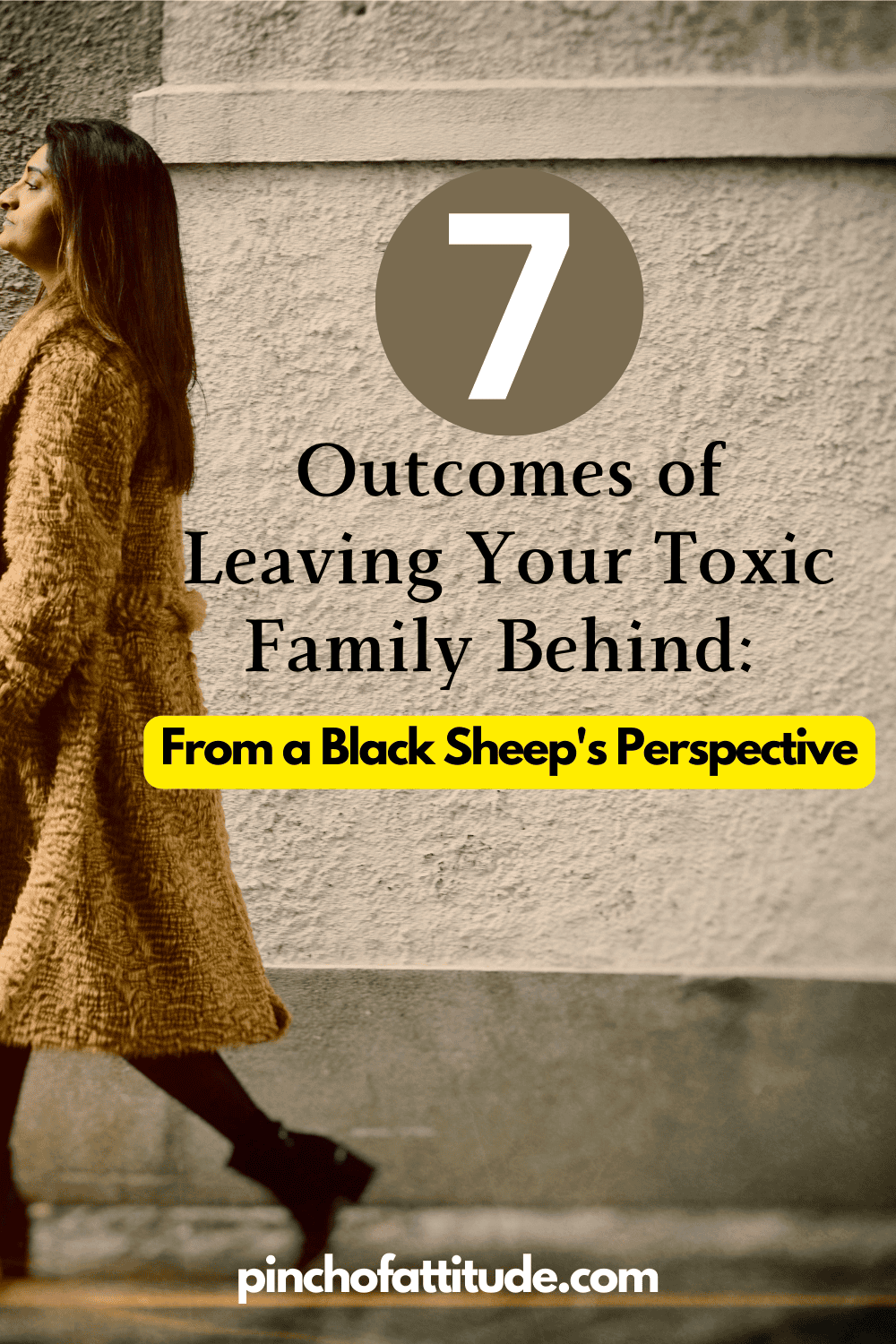As the family’s black sheep, I’ve been right where you might find yourself now, caught in the tug-of-war between family expectations and staying true to oneself.
I was the rebel, the wild card in a family of traditionalists. But like a phoenix, I rose from the ashes.
And when the black sheep walks away, something incredible happens.
It’s a story many of us know too well, you, me, and countless others navigating the tumultuous waters of family dynamics.
Walking away from my toxic mother, siblings, and family members was one of the best decisions I’ve ever made, and I want you to know that it can be yours, too.
- Walking away from your family’s expectations can disrupt established patterns, forcing everyone to confront their own issues and potentially leading to a healthier balance.
- By distancing yourself from a role of blame, you give yourself the chance to prioritize your own well-being and personal growth.
- Although the decision to step away is challenging, seeking professional support and surrounding yourself with understanding individuals can help guide you toward a more fulfilling life.
Table of Contents
7 Things That Can Happen When the Black Sheep Walks Away

I recall the moment when I decided to venture beyond the confines of my family’s expectations.
The pressure to conform to their ideals weighed heavily on my shoulders, and it seemed as though I was destined to follow a path that didn’t align with my true self.
That’s when I realized that stepping away from my position as the black sheep isn’t just about breaking free. It’s about going on a journey of personal growth and self-discovery.
Here’s how walking away can you lead a life filled with authenticity, resilience, and boundless opportunities:
1. Your Family Will Be Thrown off Balance
When I began my journey towards healing, I witnessed a profound shift in my family dynamics. It was like I had thrown a wrench into the well-oiled machinery of our dysfunctional interactions.
For years, my family had been entrenched in a cycle of trauma, drama, and blame game, with me often cast as the scapegoat.
But as I stepped away from that toxic cycle, it disrupted their established patterns. It was like watching a house of cards crumble when a gust of wind blew through.
They struggled to let go of their preconceived notions and narratives, refusing to acknowledge the healing taking place within me.
This initial turmoil was challenging for all of us, but it marked the beginning of my journey to reclaiming balance in my life.

2. You’re No Longer Available for the Customary Place of Blame
For years, I had been the convenient target for all the family’s frustrations, disappointments, and problems.
It was as though I wore a bullseye on my back, absorbing their negative emotions like a sponge.
As I distanced myself from this role, something transformative happened. I became a mirror, reflecting back to them their own issues and insecurities.
It forced my family members to confront their own actions and emotions, rather than projecting them onto me.
It’s important to recognize that stepping away from this customary place of blame can be challenging for both you and your family.
Change is seldom easy, but it is a crucial step toward healing and establishing healthier boundaries.

3. You Will Get a Chance to Focus On Your Own Well-Being and Mental Health
For so long, I was entangled in a web of drama that left me emotionally drained and mentally exhausted.
But when I walked away, I reclaimed my time and energy for myself.
I started prioritizing self-care, seeking therapy, and dedicating time to activities that brought me joy and peace.
Taking this step was instrumental in my healing journey.
It allowed me to rebuild my emotional strength, gain clarity about my own needs and desires, and nurture a healthier mindset.

4. You Finally Stay Out of the “Guilt Zone,” No More Guilt Trip From Your Family
Does your family lie to you and hurt you, yet somehow manage to cast themselves as the victim? This was my life growing up.
As the black sheep of the family, guilt had been a constant companion, skillfully wielded by my family to keep me in line.
Every decision I made that didn’t align with their expectations came with a heavy dose of guilt-tripping.
It was as if I owed them my life choices, and any deviation was met with emotional manipulation.
But that’s not the case anymore.
Walking away set me free from the shackles of guilt, no longer burdened by the weight of their expectations.
I realized that my choices were my own to make, and I didn’t owe anyone an explanation for living life on my terms.
This newfound liberation was invigorating, reminding me that I had the ability to chart my own path without the constant guilt-tripping.

5. You May Initially Feel Isolated and That’s Okay!
Walking away from my family’s expectations was undeniably liberating, but it also came with an unexpected twist: the initial sense of isolation.
As I distanced myself from the familiar but toxic bonds, I couldn’t help but feel vulnerable.
My family was my primary social circle, flawed as it may have been. Their judgments and expectations had provided a sense of structure, even if it was stifling.
When I walked away, I was suddenly without that anchor.
At first, it was tough. Loneliness settled in like an uninvited guest, and it took me some time to adjust.
It may overwhelm you in the beginning, but remember that this period of isolation was a transitional phase, not a permanent state.

6. You Will Have a Chance to Heal From Past Trauma or Emotional Abuse
For years, I had endured many conflicts, emotional abuse, and the trauma of never quite meeting my entire family’s unrealistic expectations.
I was aware of these wounds, but the distance I created allowed me to finally address them.
I sought therapy to confront the emotional scars, working through the pain, and slowly but surely, I began to heal.
It wasn’t easy, and it required facing some painful truths, but it allowed me to emerge from the shadows of my past, stronger and more resilient than ever.

7. You Will Experience a Mixed Feeling and Possibly Regret
Even today, there are moments when I can’t help but wonder if things could have turned out differently. It’s natural to feel a sense of regret or nostalgia for the bonds I once had.
But as the years passed and I had my own family, I’ve come to understand that my decision was the right one.
The mixed feelings serve as a reminder of the complexity of my family structure and the emotional weight of our choices.

What to Do if You Decide to Leave Your Family

Deciding to step away from your family is not an easy decision and often a challenging choice, one that many black sheep can relate to on a profound level.
It’s a decision that demands courage, self-reflection, and a deep understanding of your own worth.
As someone who has gone through it all, I want you to know that you’re not alone.
Whether you’ve already made the choice or are contemplating it, these steps can help you navigate this transformative path with resilience and authenticity:
1. Reflect on Your Decision Before Planning Your Exit
Before taking any concrete steps, take the time to deeply reflect on your decision. Make sure that walking away from your family is truly what you want.
It’s a significant life choice, and understanding your motivations and the potential consequences is essential.
Examine your reasons, weigh the emotional toll, and consider the impact it may have on your future.
Only when you’re certain that this is the right path for your well-being and growth should you move forward with planning your exit.
Remember, self-awareness is your compass on this journey.
2. Communicate Thoughtfully With Your Family
While your decision is ultimately about your well-being and authenticity, being honest about why you’re leaving can lead to a smoother transition.
Share your reasons calmly and respectfully, emphasizing that your choice is a personal one aimed at self-growth.
Their reactions may vary. Some may be indifferent, while the rest of the family might have a more emotional response.
Regardless of their reactions, remember that you are making this choice for yourself, not for their approval.
Every family dynamic is unique, so approach this conversation with empathy and openness to ensure a more positive outcome.
3. Stay Away Until You’re Absolutely Sure You Can Handle Coming Back
Give yourself the time and space needed. Resist the temptation to return too soon or under pressure from family.
Stay away until you’re absolutely certain that you’ve developed the resilience and boundaries necessary to handle any potential challenges that might arise if and when you return.
This period of separation allows you to nurture your own well-being and gain clarity about your identity.
It will also ensure that any future interactions with your family are on terms that align with your authenticity and values.
4. You Do Not Have to Communicate When You’re Away
If maintaining contact feels emotionally taxing or counterproductive to your healing, it’s perfectly acceptable to limit or temporarily cut off communication.
This decision allows you to focus on your own journey of self-discovery without the influence of family dynamics.
Reconnect when you feel ready and equipped to engage in a healthy and constructive relationship with your family.
5. Watch Out for the Guilt That You May Feel
Guilt can be a powerful and unwelcome companion, often stemming from societal expectations and a sense of duty.
You may question whether you’re making the right choice or feel responsible for remaining family members.
While guilt is a natural emotion in these circumstances, it doesn’t define your decision’s validity.
Recognize it, acknowledge it, and then let it go. This way, it doesn’t undermine your journey toward self-discovery and personal growth.
6. You Must Learn to Break the Patterns
Breaking free from family patterns and habits is an important aspect of your journey.
If there were family activities or rituals that symbolized those patterns, leave them behind as you step away.
These routines might have been deeply ingrained in your family’s dynamics, perpetuating unhealthy behaviors or expectations.
By consciously choosing not to carry them with you, you assert your commitment to breaking free from these patterns.
I can imagine it can be challenging, as these habits may hold sentimental value or familiarity, but it is a necessary step for your growth.
Replacing them with new, healthier practices can help you forge a path that aligns with your values and aspirations, unburdened by the weight of the past.
7. Seek Help and Support
Emotionally decompressing from the decision to walk away from your family can be a lengthy and complex process.
During this journey, seeking help and support is not just beneficial but also transformative.
Consider consulting with a therapist or counselor who specializes in family dynamics and personal growth.
They can provide invaluable guidance, a safe space to explore your emotions, and strategies for coping with the challenges that may arise.
Additionally, reaching out to an individual who has walked a similar path can be incredibly comforting and enlightening.
They can offer fresh insights, share their experiences, and provide emotional support that only someone who has been through a similar situation can truly understand.
Remember, you don’t have to navigate this journey alone.
Seeking help and support can make all the difference in helping you heal, grow, and find your authentic path in life.
Related Posts:
- The Black Sheep of the Family: Why I’m So Thankful for Being One
- Signs You Are the Black Sheep of Your Family: How I Remain Authentic and Adore My Unique Traits
- I Was the Black Sheep of the Family and How I Got Out and Win!
- Why Am I the Black Sheep of the Family? And Why I Don’t Allow It to Define Me
- When The Black Sheep Becomes Successful: I’m Not Sorry About it! Nope
Frequently Asked Questions
What can happen when the “black sheep” of the family decides to walk away?
When you decide to walk away as the black sheep, you take on a journey of personal growth, potentially disrupt family dynamics, and have an opportunity to focus on your own well-being.
How will your family react if you choose to distance yourself from their expectations?
Your family may feel thrown off balance and initially struggle with the change. However, it’s important for you to prioritize your own well-being and mental health.
If you distance yourself, will you always feel isolated from your family?
You might initially feel isolated when distancing yourself from family dynamics but remember that you’re going through a transitional phase, and this feeling is temporary.
What should you do if you’re contemplating stepping away from your family?
If you’re considering leaving, reflect deeply on your decision, communicate thoughtfully with your family, and give yourself time before potentially returning.
Is it necessary to communicate with your family while you’re away?
No, you do not have to communicate while you’re away. Prioritize your healing and only reconnect when you’re ready for a healthy relationship.




